#EthicalClothing
Explore tagged Tumblr posts
Text
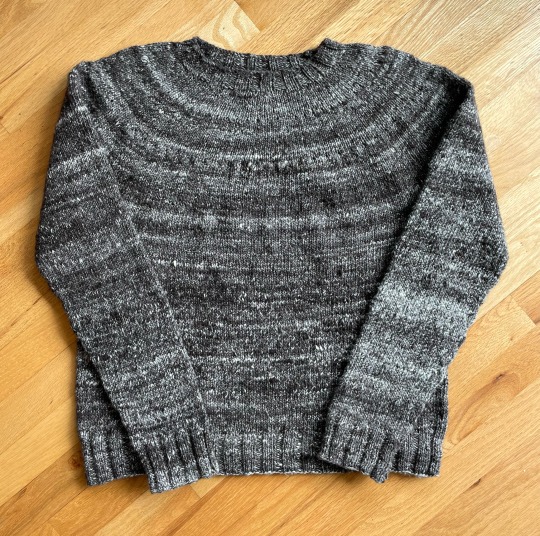
Just finished this seamless top-down pullover. I used a Noro yarn made with humanely raised wool from New Zealand and raw silk, all dye-free.
110 notes
·
View notes
Text
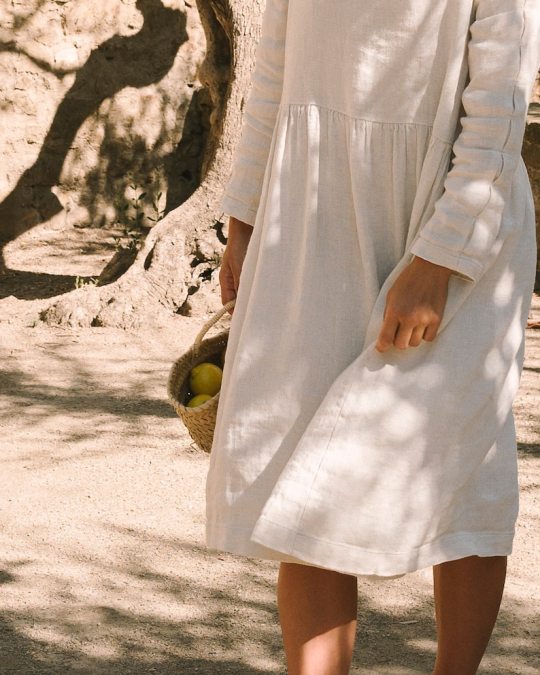
Oversized linen dress perfect for warmer holiday days and for those who love a sustainable and ethical lifestyle.
53 notes
·
View notes
Video
tumblr
Some pieces I made recently ✨🔥
Leave me a 🖤 if you want to see the next drop!
#handmadeclothing#lunaticpin#handmadesmallbiz#handmadebusiness#smallbusinessuk#smallbusinesslondon#smallbizowner#ethicalclothing#ethicalfashion#alternative#alternativeclothing#imadeyourclothes#whomadeyourclothes#womeninbusiness#alternativehandmade#e17#fashion#fashionbrand#fashioninstagram#sizeinclusive#ukbased#imadeit
33 notes
·
View notes
Text
Sustainable Fashion Revolution: The Ultimate Guide to Dress Responsibly and Look Fabulous in 2023
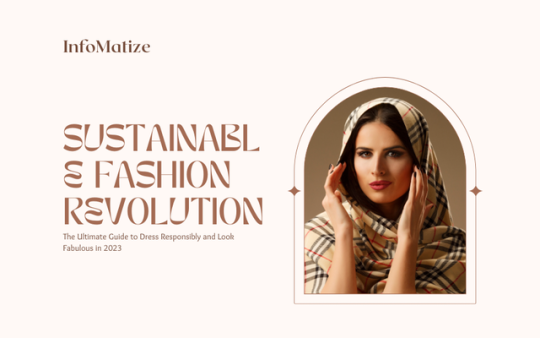
Introduction
Sustainable fashion has gained significant attention in recent years, as consumers and brands alike are becoming more aware of the negative impact of the fashion industry on the environment and society. Sustainable fashion refers to the production, use, and disposal of clothing items in an environmentally responsible and socially conscious manner. Here are some key takeaways from the provided web search results regarding sustainable fashion and how it can help us dress responsibly in 2023: - Sustainable fashion is an emerging trend in the fashion industry, but progress remains slow . - Creating a greener wardrobe is a simple step towards sustainability. It involves taking stock of your existing wardrobe, choosing sustainable fabrics, and supporting sustainable brands . - Sustainable fashion brands use natural or recycled fabrics that require less or no chemical treatment, less water, and less energy. Some of the most sustainable fabrics include linen, hemp, organic cotton, and Tencel . - There are several sustainable fashion brands that offer stylish and environmentally friendly clothing options. These brands source upcycled fabrics and eco-minded materials for their clothing, and prioritize ethically sourced and sustainable materials and working conditions. Some of the top sustainable fashion brands include Christy Dawn, Reformation, Cuyana, Amour Vert, Whimsy + Row, and Mara Hoffman . - Sustainable fashion is a key step towards dismantling the fast fashion industry, which is responsible for more greenhouse gas emissions than the shipping and aviation industries combined . - Sustainable fashion is also gaining traction among consumers. A 2020 report on sustainability in fashion found that 67% of shoppers now consider environmentally friendly fabrics when choosing a brand . - The fashion industry is taking steps towards sustainability, such as Copenhagen Fashion Week's sustainability requirements for participating designers, with the goal of setting a new industry standard . In conclusion, sustainable fashion is a key aspect of dressing responsibly in 2023. By choosing sustainable fabrics, supporting sustainable brands, and taking steps towards a greener wardrobe, we can contribute to a more environmentally friendly and socially conscious fashion industry.
Sustainable Materials for Fashion
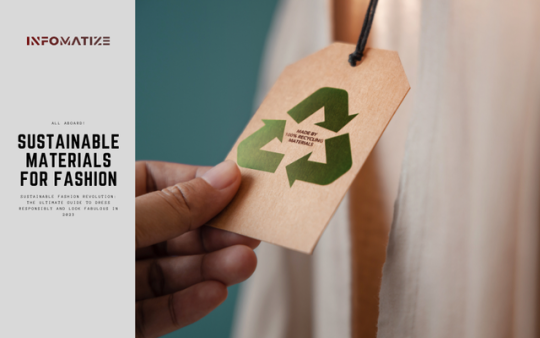
Sustainable fashion has gained increasing attention in recent years due to the negative environmental impact of the fashion industry. Several sustainable materials can be used in a fashion that minimizes waste, reduces carbon emissions, and conserves natural resources. Some of the most commonly used sustainable materials in fashion include organic cotton, recycled cotton, hemp, linen, bamboo, cork, ECONYL® recycled polyester, Lyocell, Modal, ECOVERO™, Piñatex, and Bananatex® . The fashion industry's conventional raw materials sourcing has contributed significantly to the planet's declining health, including petroleum refining for polyester, water contamination and depletion, soil degradation, and deforestation for industrial cotton and viscose production. Consequently, the industry is turning to sustainable materials that prioritize the environment and promote ethical practices in production. Polyester, which accounts for approximately 65% of all clothing, is produced from fossil fuels and consumes 70 million barrels of oil annually, causing significant pollution to the environment. Similarly, the fashion industry uses considerable amounts of fossil fuel-based plastic for packaging and hangers. Less than one per cent of clothing is recycled to make new clothes, which contributes to significant waste generation in the industry . Wool is another sustainable fabric that can be produced sustainably, depending on how it's made. Climate Beneficial™ Wool produced on carbon farming landscapes captures carbon and puts it back into the soil. Wool is also compostable, insulating, and does not shed plastic microfibers . Several sustainable materials are emerging, and luxury brands are turning to them to respond to customer demand for greener textiles. Examples include mushroom leather and pineapple fabric, which are gaining popularity and could play a significant role in sustainable fashion in the future . Several sustainable fashion brands prioritize using sustainable materials in their production, including Outerknown, which sources 90% of its fibres from sustainable materials such as recycled mango fruit, organic cotton, recycled Polyurethane (PU) leftovers, and environmentally-certified leather. Similarly, Reformation, based in Los Angeles, uses upcycled sneakers made of sustainable materials such as recycled mango fruit, organic cotton, recycled Polyurethane (PU) leftovers, and environmentally-certified leather. . Other sustainable materials include linen and hemp, which were commonly used in clothing in the past. Hemp is three times stronger than cotton, UV-resistant, durable, breathable, and can be grown without fertilizer or pesticides. It also requires less water to grow compared to cotton . Recycled plastic bottles are also a sustainable material used in fashion production, and they are being adopted by many designers due to their eco-friendliness . In conclusion, several sustainable materials are available for use in fashion production, ranging from organic and recycled cotton, hemp, linen, and bamboo to mushroom leather and pineapple fabric. Sustainable fashion brands prioritize The Rise of Recycled Materials in Sustainable Fashion Sustainable fashion has become a growing trend in the fashion industry, and the use of recycled materials is one of the ways that fashion brands are becoming more eco-friendly. Recycled materials, such as organic cotton, hemp, and linen, are being used in fashion lines to reduce waste and carbon emissions. Some fashion brands are even implementing compostable packaging and branding to further reduce their environmental footprint . The use of recycled materials in sustainable fashion is not only beneficial to the environment but it can also be implemented through fair labour practices, such as the Maasai beadwork. Additionally, upcycling, a process that transforms waste and byproducts of manufacturing into new products, has gained popularity in the fashion industry. Designers like Ancuta Sarcas have even started upcycling discarded Nike shoes and high-waste materials like mesh to create unique fashion pieces . The COVID-19 pandemic has further accelerated the demand for eco-friendly fashion. Fashion brands, manufacturers, and traders are looking at more sustainable approaches to meet the market demand for products meeting environmental, social, and governance (ESG) criteria. Carbon emissions reduction is also one of the targets of global efforts to promote sustainable economic development . Overall, recycled materials are becoming increasingly prevalent in a sustainable fashion as designers and brands look for ways to reduce waste and carbon emissions while still producing stylish and unique fashion pieces. Organic Cotton: The Benefits for the Environment and Your Wardrobe Organic cotton is cotton grown without the use of synthetic chemicals such as fertilizers, pesticides, or genetically modified organisms (GMOs). It offers various benefits to the environment and to the people wearing the clothes made from it. One of the most significant benefits of organic cotton is that it requires much less water to grow compared to conventional cotton. The farming process used in organic cotton production relies on rainwater for about 80% of its needs, resulting in approximately 71% less water used overall . Additionally, organic cotton cultivation methods avoid the use of synthetic fertilizers, which can lead to soil degradation and pollution of water sources, ultimately helping to prevent water contamination . Furthermore, organic cotton production methods play a role in mitigating climate change by avoiding the use of synthetic chemicals, reducing energy consumption, and sequestering carbon more efficiently in healthier soils . As such, it has been established that organic cotton cultivation has significant environmental benefits, such as promoting biodiversity, reducing greenhouse gas emissions, and helping to prevent soil erosion and degradation . Aside from its environmental benefits, organic cotton is also better for the farmers who grow it. They are not exposed to harmful chemicals that can cause a range of health problems, including respiratory issues and cancer . Moreover, organic cotton is also softer and less likely to cause irritation than conventional cotton, making it a better choice for those with sensitive skin . In summary, the benefits of organic cotton are numerous, and it is an excellent choice for those looking to reduce their impact on the environment while also supporting the health and well-being of farmers and consumers. The Future of Sustainable Textiles: Innovations and Breakthroughs Sustainable textiles are becoming increasingly important in the fashion industry. Several recent developments suggest that innovative and groundbreaking new textiles are on the horizon. Researchers at MIT are exploring the intersection of textile research and sustainable materials, seeking potential synergies that could advance the field . McKinsey and Company predict that there will be significant growth in sustainable fashion consumption, particularly in products made from more sustainable materials such as organic cotton . Science Daily reports on new textiles that can change shape when heated, potentially offering designers a wide range of new options for responsive and adjustable aesthetics . Drapers Online covers a variety of textile innovations, offering insights into the latest developments in the industry . Finally, the European Commission has launched a roadmap for the future of sustainable textiles in the EU, outlining efforts to increase the circularity of the fashion ecosystem . With these developments and more, it seems clear that sustainable textiles are an area of rapid innovation and growth, and we can expect exciting breakthroughs in the near future.
The Circular Fashion Movement
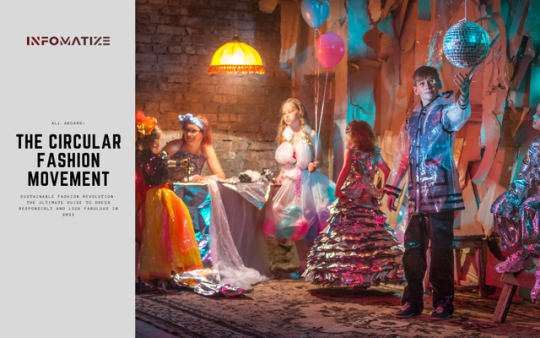
The Circular Fashion Movement is a growing global trend in the fashion industry that aims to promote sustainable and responsible production and consumption of clothing while reducing the negative impact of the fast fashion industry on the environment and society. Circular fashion involves designing, producing, and using clothes that are meant to be used and circulated responsibly and effectively for as long as possible, and then safely decomposed or repurposed when they are no longer of use to humans . The movement has gained significant momentum in recent years, with numerous fashion brands and organizations committing to circularity commitments and initiatives, such as take-back and resale programs, upcycling, and closed-loop production systems . The Circular Fashion Pledge is a simple concept that asks fashion brands to pledge to one or more circularity commitments by the end of the calendar year, such as enabling take-back or resale programs . Circular fashion has been identified as a key solution to the environmental and social challenges posed by the fast fashion industry, including waste, pollution, exploitation of labour, and depletion of resources . The movement has also gained significant attention and support from sustainability experts and advocates, who believe that it can help to create a more equitable, resilient, and sustainable fashion industry that benefits both people and the planet. Overall, the Circular Fashion Movement represents a growing global trend towards more sustainable and responsible fashion production and consumption and has the potential to revolutionize the way we approach clothing and fashion in the future. Understanding Circular Fashion: What It Is and Why It Matters Circular fashion is a concept that has emerged from the intersection of the circular economy and sustainable and ethical fashion . Essentially, it refers to a system in which all garments can be reused, recycled, or returned to the earth (by virtue of being biodegradable or compostable), reducing the hugely damaging impact the fashion industry has on the planet . In other words, products are designed and developed with the next use in mind, with the aim of keeping resources in use for as long as possible and minimizing waste . The fashion industry has long been known for its negative impact on the environment, including the strain on natural resources, the vast amount of CO2 emissions it produces, and the giant heaps of clothing that end up in landfills . Circular fashion is one solution to this problem, as it aims to reduce the harmful impact of fast fashion by circulating and reusing articles for as long as possible before decomposing them safely . Circular fashion also means using sustainable and natural materials in production, such as organic cotton, bamboo, and Tencel, and avoiding synthetic and plastic fabrics like polyester and nylon derived from fossil fuels . Additionally, the production and transport of items should be powered by renewable energy sources . In summary, circular fashion is a sustainable and ethical approach to fashion that aims to reduce waste and minimize the harmful impact of the industry on the environment. It involves reusing, recycling, and upcycling as much as possible, using sustainable and natural materials, and powering production and transport with renewable energy sources . From Cradle to Cradle: The Principles of Circular Fashion Design Circular fashion design principles are heavily influenced by the cradle-to-cradle (C2C) approach, which is a design framework for creating products that mimic natural systems and support the circular economy. The C2C approach promotes the high-quality use and circulation of biological and technical nutrients, protecting and enriching ecosystems while enabling economic productivity . The aim of the C2C approach is to optimize products from the molecular to modular level and establish these principles in all industry sectors, including the textile industry, consumables, buildings, automotive, packaging, and cosmetics . Circular fashion design principles follow the four principles of the circular economy: preservation of natural capital, optimization of available resources, risk reduction, and renewable flow of resources and products . The principles of circular fashion design also emphasize the importance of planning the entire lifecycle of a product at the design stage, incorporating aspects such as sustainable materials, biodegradability, recyclability, and durability. Circular fashion aims to eliminate waste, pollution and the negative environmental impact of the fashion industry, by designing products for reuse, recycling, and composting . Closing the Loop: How Brands are Embracing Circular Fashion Circular fashion refers to a closed-loop system that rethinks and redesigns the way products are made, used, and discarded to reduce waste and promote sustainability. Many fashion and luxury companies, including LVMH, Kering, H&M, VF Corp, and Gap, have embraced circularity as a way to reduce their environmental footprint . A fully closed-loop apparel recycling system in California could achieve a total holistic impact of $11 billion to $13 billion a year, based on the estimate of the total holistic impact of approximately $5.5 billion to $6.5 billion from closed-loop recycling of polyester, which represents a significant portion of textile production . In order to combat unethical practices in the fashion and textile industry, the industry must embrace a closed-loop system, rethinking and redesigning the way products are made, used, and discarded . Many fashion brands are now working towards closing the loop on waste and promoting circular design, such as Loop Swim, a brand that transforms post-consumer plastic bottles into sun-protective swimwear . In February 2022, Reformation launched RefRecycling, a program that allows customers to return any well-worn Ref goods to the company to be recycled, thus promoting circular fashion and reducing waste .
Ethical and Slow Fashion
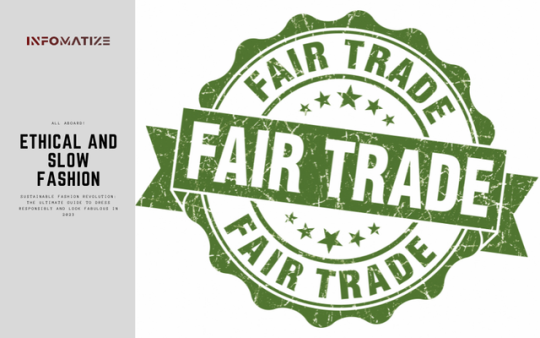
Ethical and slow fashion are two related concepts that are gaining more attention in the fashion industry. While they share some similarities, they also have distinct differences. Ethical fashion focuses on ensuring fair treatment of workers throughout the supply chain, from safe working conditions to fair wages and eliminating child and slave labour . It also considers the treatment of animals, making sure that the materials used in clothing production are cruelty-free . On the other hand, slow fashion is about producing high-quality, timeless clothing that is sustainable and environmentally friendly . Slow fashion leans into sustainable practices, such as using eco-friendly materials and minimizing waste . Both ethical and slow fashion is countercultural, going against the current societal norms that prioritize fast and cheap production over ethical and sustainable practices. Hallmarks of slow fashion include longer production timetables, fewer items produced, and more ethical labour practices, with an emphasis on creating timeless pieces that will stand the test of time . In summary, ethical fashion is focused on the fair treatment of workers and animals throughout the supply chain, while slow fashion is about sustainable and timeless clothing production. Both concepts are aimed at creating a more sustainable and ethical fashion industry, challenging the norm of fast and cheap fashion production. Slow Fashion: The Antidote to Fast Fashion Slow Fashion is an approach to clothing production that takes into account all aspects of the supply chain, including the environmental and social impact, as well as animal welfare. It aims to create sustainable, ethical, and high-quality garments, produced on a smaller scale with more eco-conscious materials and locally manufactured to reduce transportation and promote fair wages for workers . In contrast to fast fashion, where clothing is produced quickly and cheaply with a focus on trends and low prices, slow fashion considers the long-term impact of the production process and encourages consumers to value quality over quantity . If you're interested in adopting slow fashion practices, here are a few tips to get started: - Have a clear-out of your closet and donate or sell the clothes you don't wear anymore to avoid cluttering and promote the use of existing garments . - Buy clothes made from sustainable and eco-friendly materials such as organic cotton, recycled fabrics, or biodegradable fibres . - Choose locally-produced garments to support your community and reduce the environmental impact of transportation . Read the full article
#Consciousfashion#Eco-consciousfashion#Eco-friendlyclothing#Eco-friendlyfashion#Ethicalclothing#Ethicalfashion#Fashionrevolution#Responsiblefashion#Slowfashion#Sustainableclothingbrands#Sustainablefashion#Sustainablefashionbloggers#Sustainablefashionbrands#Sustainablefashionforallages#Sustainablefashionforallbeliefs#Sustainablefashionforallbodytypes#Sustainablefashionforallbudgets#Sustainablefashionforallcelebrations#Sustainablefashionforallclimates#Sustainablefashionforallcultures#Sustainablefashionforallethnicities#Sustainablefashionforallevents#Sustainablefashionforallgenders#Sustainablefashionforallhobbies#Sustainablefashionforallholidays#Sustainablefashionforallinterests#Sustainablefashionforalllifestyles#Sustainablefashionforalllocations#Sustainablefashionforallnationalities#Sustainablefashionforalloccasions
2 notes
·
View notes
Text

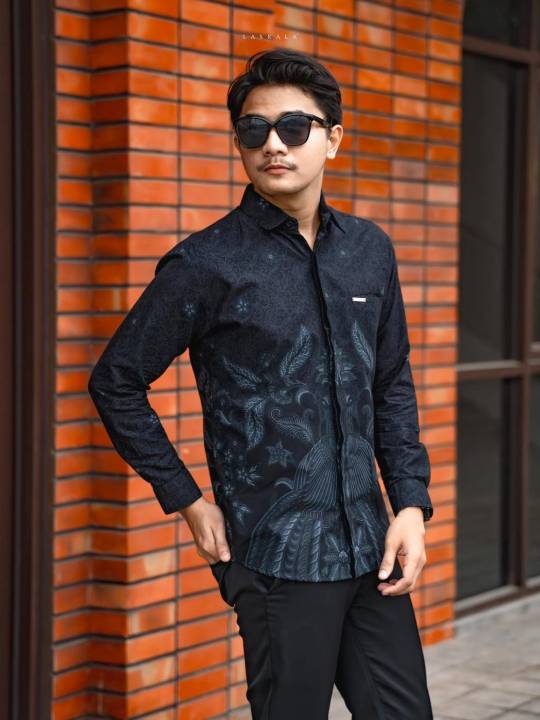





#menswear#fashionformen#slowfashion#ethicalclothing#handmadefashion#batikshirt#indonesianstyle#heritagefashion#luxuryfashion#streetwearluxury#etsy seller#handmade shop#etsy finds#small business support#shop small#independent brand#fashion marketplace#handmade with love#etsy fashion#unique style#global marketplace#support artisans#fashion entrepreneur#bespoke clothing#custom menswear#sustainable fashion#exclusive collection#limited edition
0 notes
Text
Global Warming Saves Lives Shirt
Stand Out in Style – Global Warming Saves Lives Shirt
Make a bold statement with the Global Warming Saves Lives Shirt. Designed for individuals who value wit, irony, and awareness, this shirt blends humor with a touch of environmental consciousness. Its sleek design and powerful message make it a conversation piece you’ll love wearing.
Store here: https://www.usatrendyshirt.com/global-warming-saves-lives-shirt
Features:
High-quality cotton for maximum comfort.
Durable print with an eye-catching slogan.
Unisex fit, suitable for all.
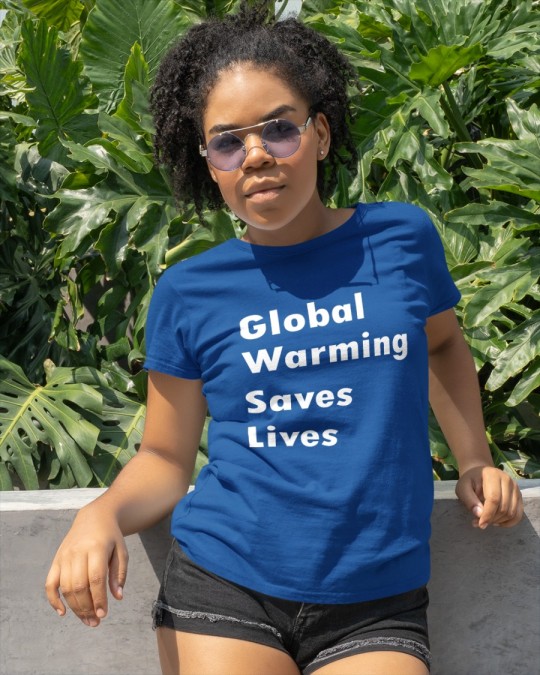
Perfect for casual outings, events, or as a gift for someone with a great sense of humor and style.
#GlobalWarmingSavesLives#SustainableFashion#EcoFriendlyApparel#ClimateChangeAwareness#EthicalClothing#GoGreenStyle#ConsciousFashion#PlanetFriendlyThreads#BoldStatements#WearYourValues
0 notes
Text
#sustainableclothing#organiccottontshirts#menswear#womenwear#unisextshirts#ecofriendlyclothing#ethicalclothing#jaipur#umbai#pune#]#delhi
0 notes
Text
Exclusive Party Dresses.
Check Details: https://www.dailydeal365.com/2024/04/elevate-your-style-with-womens-party.html
#clothing#clothingbrand#clothingline#mensclothing#kidsclothing#womensclothing#usedclothing#clothingstore#womenclothing#babyclothing#boutiqueclothing#sisesaclothing#modestclothing#handmadeclothing#customclothing#clothingboutique#urbanclothing#wholesaleclothing#childrensclothing#clothingcompany#menclothing#sullenclothing#sustainableclothing#premiumclothing#bangkokclothing#clothings#girlsclothing#ethicalclothing#clothingbrands#muslimahclothing
0 notes
Text
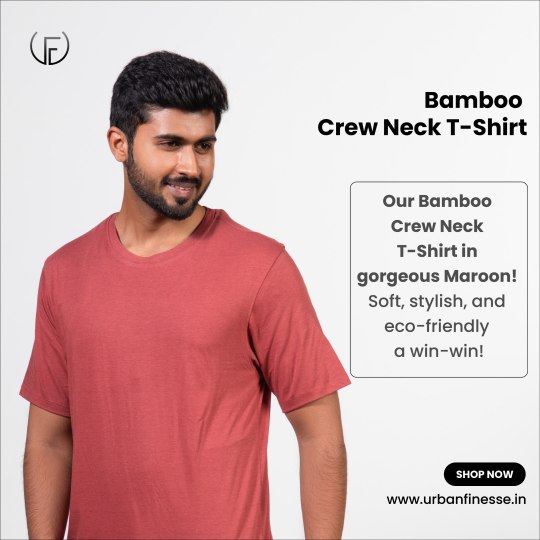
Urban Finesse presents our Bamboo Crew Neck T-Shirt in stunning maroon! 🌿✨ Soft, stylish, and eco-friendly – it’s more than just clothing; it’s a statement of sustainable living. Get yours now at Urban Finesse! Reach us: https://urbanfinesse.in/products/bamboo-crew-neck-maroon
Bamboo Crew Neck T-shirt
#BambooTee#EcoFashion#SustainableStyle#BambooClothing#GreenFashion#BambooFashion#EcoFriendlyWear#CrewNeckTee#BambooApparel#SustainableFashion#BambooComfort#NatureFriendlyWear#BambooThreads#OrganicTShirt#NaturalFibers#BambooEssentials#FashionForChange#EthicalClothing#BambooChic#ConsciousFashion
0 notes
Text
Fashion Goals.

Walking into the week like a sustainable fashion icon. 💁♂️🌿 Who said saving the planet can't be fabulous? #EcoChicGoals
#SustainableFashion#EthicalClothing#SlowFashion#ConsciousFashion#EcoFriendlyStyle#GreenWardrobe#FashionRevolution#FairTradeFashion#CircularFashion#EthicalStyle#SustainableStyle#FashionWithPurpose#MindfulFashion#LowImpactFashion
0 notes
Photo

Happy Saturday! #slowfashionmovement #slowfashionseason 🥰🥳👏🏿❤️ #beintheknow . . . . . . . . #sustainablefashion #sustainability #sustainableliving #ecofashion #ecofriendly #ecoresponsable #handmadewithlove #handmadejewelry #handmadebag #ethicalfashion #ethicalclothing #ethicallymade #ethicalbrand #localbusiness #supportlocal #shoplocal #consumelocal (at Boutique Espace Urbain) https://www.instagram.com/p/CqOMbzCA_xs/?igshid=NGJjMDIxMWI=
#slowfashionmovement#slowfashionseason#beintheknow#sustainablefashion#sustainability#sustainableliving#ecofashion#ecofriendly#ecoresponsable#handmadewithlove#handmadejewelry#handmadebag#ethicalfashion#ethicalclothing#ethicallymade#ethicalbrand#localbusiness#supportlocal#shoplocal#consumelocal
1 note
·
View note
Text
Understanding Sustainable Fashion
In an era where environmental consciousness is on the rise, sustainable fashion has emerged as a key player in the fight against climate change. Sustainable fashion refers to the creation of clothes, shoes, and accessories in environmentally and socio-economically sustainable manners. This includes minimizing waste, reducing carbon footprints, and ensuring fair labor practices. With the fashion industry being one of the largest polluters globally, the shift towards sustainability is not just a trend but a necessity.
The Importance of Sustainable Fashion
The fashion industry's impact on the environment is staggering. From the excessive use of water and energy to the pollution caused by chemical dyes and synthetic fibers, the traditional fashion model is unsustainable. Sustainable fashion aims to address these issues by promoting practices that are kinder to the planet. This includes using organic materials, recycling and upcycling garments, and adopting ethical production processes. By choosing sustainable fashion, consumers can make a positive impact on the environment and support brands that prioritize social responsibility.
Top Sustainable Fashion Brands
Patagonia Patagonia is a pioneer in the sustainable fashion industry. Known for its outdoor apparel, the brand has committed to using recycled materials and organic cotton. Patagonia also donates 1% of its sales to environmental causes and encourages customers to repair, reuse, and recycle their products.
Stella McCartney As a luxury fashion brand, Stella McCartney has set a high standard for sustainability in the fashion world. The brand avoids the use of leather and fur, opting instead for innovative materials like recycled polyester and organic cotton. Stella McCartney also focuses on reducing waste and promoting circular fashion through its "World of Sustainability" initiative.
Eileen Fisher Eileen Fisher is dedicated to creating timeless, sustainable fashion pieces. The brand prioritizes organic fibers, recycled materials, and fair labor practices. Eileen Fisher's "Renew" program encourages customers to return worn clothing, which is then cleaned, repaired, and resold or transformed into new designs.
People Tree As a fair-trade fashion brand, People Tree is committed to ethical production and sustainability. The brand works with artisans and farmers in developing countries, ensuring fair wages and safe working conditions. People Tree uses organic cotton, natural dyes, and traditional handcraft techniques to create beautiful, sustainable clothing.
Reformation Reformation is known for its trendy, eco-friendly fashion. The brand uses sustainable fabrics like TENCEL™, recycled cotton, and deadstock materials. Reformation also tracks its environmental footprint and offsets its carbon emissions, making it a favorite among eco-conscious fashionistas.
Everlane Everlane focuses on transparency and ethical manufacturing. The brand works with factories that meet high standards for fair wages, reasonable hours, and environmental impact. Everlane uses sustainable materials like recycled polyester and organic cotton, and it provides detailed information about the cost and production of each item.
Tentree Tentree is a brand that plants ten trees for every item purchased. The brand uses sustainable materials such as organic cotton, recycled polyester, and TENCEL™. Tentree aims to plant one billion trees by 2030, making it a leader in both sustainable fashion and environmental activism.
Allbirds Known for its comfortable and sustainable footwear, Allbirds uses natural materials like merino wool, eucalyptus tree fiber, and sugarcane. The brand is committed to minimizing its carbon footprint and has become a popular choice for eco-friendly shoes.
#fashion#sustainable#smartfashion#ecofashion#eco friendly#eco-friendly fashion#sustainable fashion#slow fashion#upcycling#upcycle#recycle#fashion brands#ethicalclothes#ethical clothing#vintage#vintage fashion#ethical fashion
2 notes
·
View notes
Text
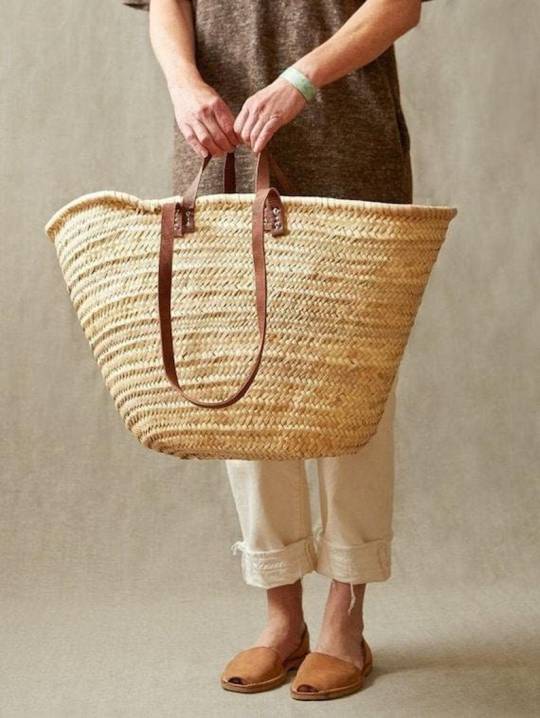
Slow Fashion
0 notes
Photo
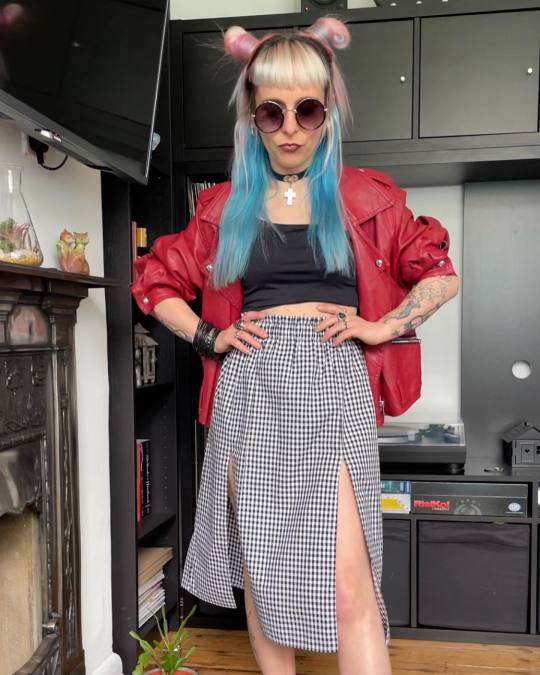
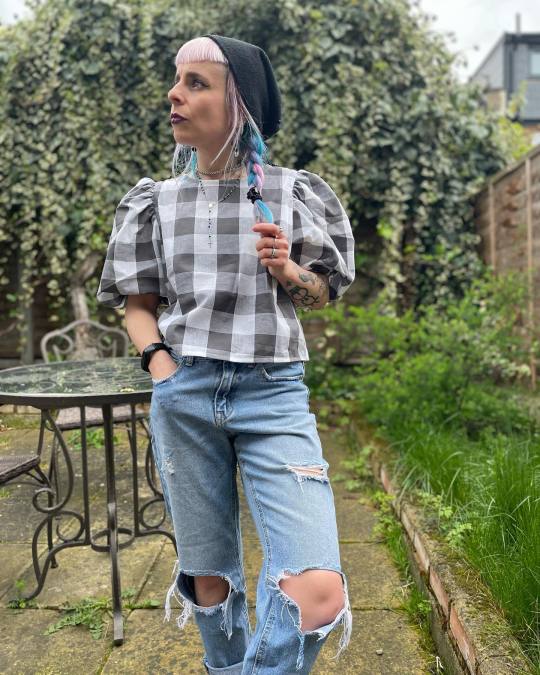
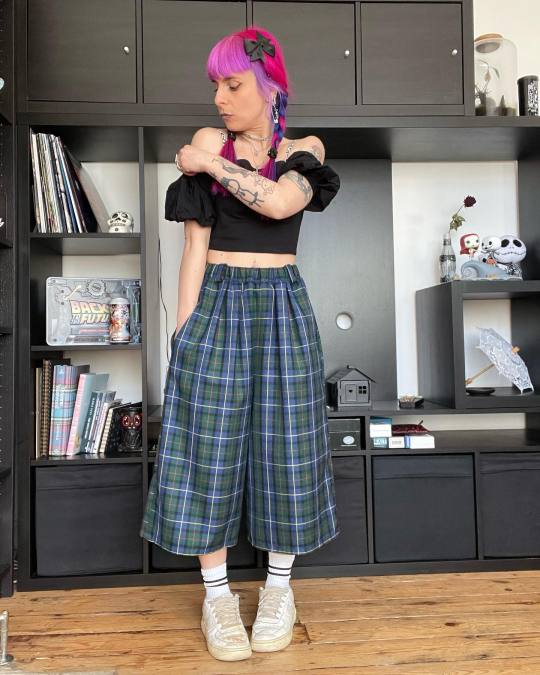
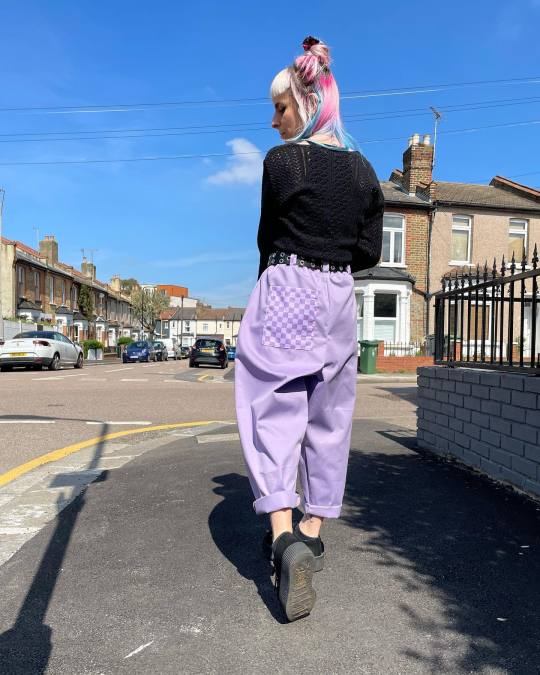

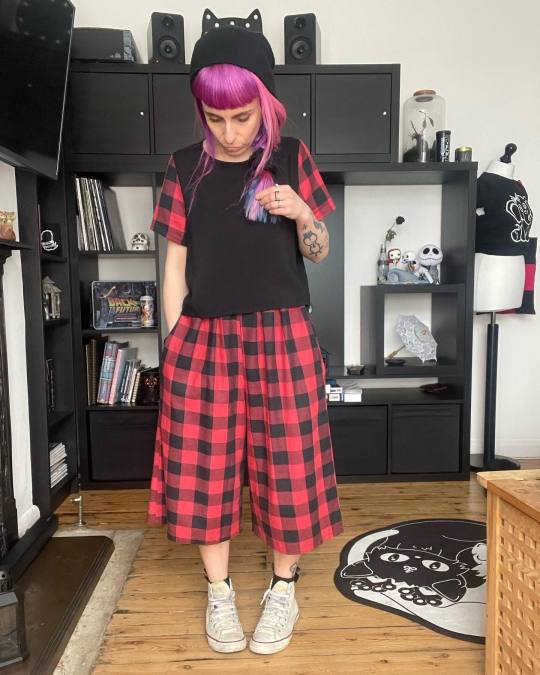
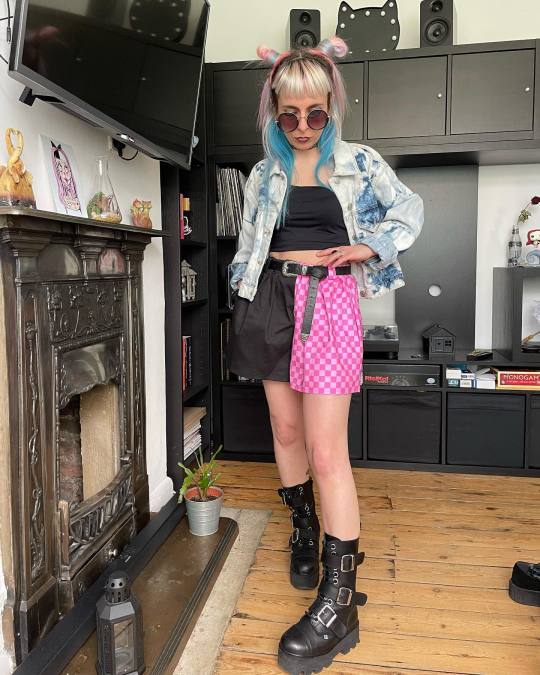
Which look is your favourite?
✨LOOK 1: Lily top with b&w gingham sleeves and denim jeans ✨LOOK 2: Valerie trousers in Scottish tartan and black crop top ✨LOOK 3: Johnny trousers in lilac and black top ✨LOOK 4: Black and pink split shorts, crop top and denim jacket ✨LOOK 5: Ines top and Valerie trousers in black and red ✨LOOK 6: Cindy top in grey large gingham and denim ✨LOOK 7: Maggie skirt, crop top and red jacket
All the items are made to order and available on my shop🖤
#handmadeclothing#lunaticpin#handmadesmallbiz#handmadebusiness#smallbusinessuk#smallbusinesslondon#smallbizowner#ethicalclothing#ethicalfashion#alternative#alternativeclothing#imadeyourclothes#whomadeyourclothes#womeninbusiness#alternativehandmade#e17#fashion#fashionbrand#fashioninstagram#sizeinclusive#ukbased
8 notes
·
View notes
Text
"Green Glamour the Green Revolution in Fashion"
Green Glamour: Embracing Eco-Fashion for a Sustainable Style Revolution” In a world increasingly conscious of its environmental impact, the fashion industry is undergoing a transformative shift towards sustainability. This article explores the burgeoning eco-fashion movement, highlighting the importance of sustainable style choices for a greener and more ethical approach to…
View On WordPress
0 notes
Text
🌿 A Great Start to 2025! 🌿
A strong beginning sets the tone for the journey ahead, and we are stepping into 2025 with immense gratitude and excitement! This January has been the best January in our journey since 2017, and it’s all because of you—our wonderful community! 💛
The overwhelming love, trust, and support we’ve received from our customers have filled our hearts with joy. Every kind word, thoughtful review, and shared experience motivate us to continue evolving, improving, and crafting timeless linen pieces that bring comfort and beauty into your lives.
At La Petite Alice, we believe in continuous growth—not just as a brand, but as a family that cherishes authenticity, craftsmanship, and sustainability. Your encouragement pushes us to innovate, adapt, and refine our work so that we can offer you the very best.
Thank you for being part of our journey. We look forward to growing together, spreading love, and making 2025 a truly remarkable year!
With gratitude,
La Petite Alice Team.
#LinenLove #HandmadeWithLove #SustainableFashion #EthicalClothing #SlowFashion #LinenForLife #MadeToOrder #GratefulHeart #AuthenticLiving #LaPetiteAlice
2 notes
·
View notes